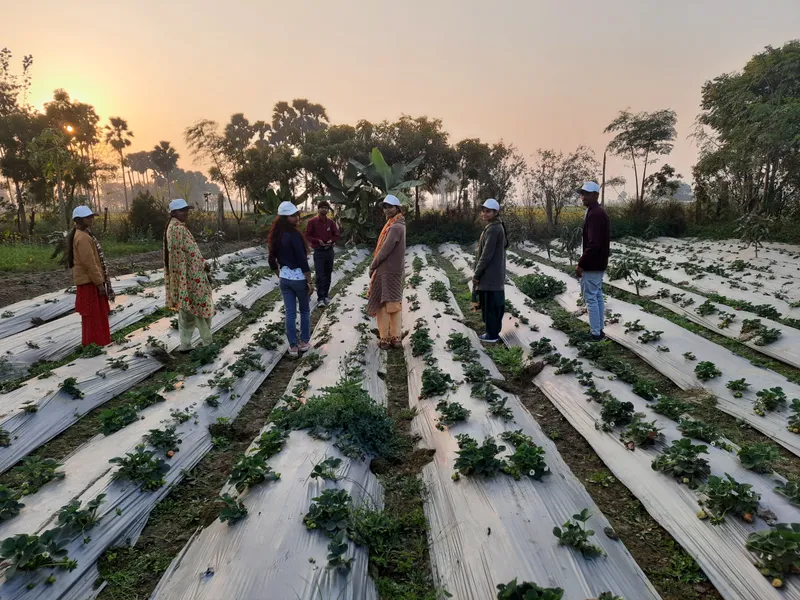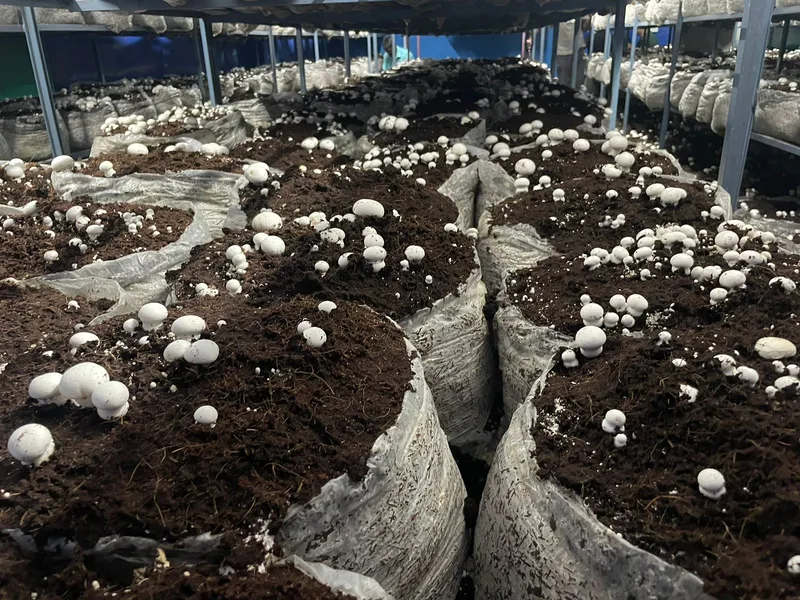Doubling returns on crops, this engineer's NGO is making farming profitable in Bihar
Prabhat Kumar's NGO, SumArth, has supported over 10,000 farmers through projects focused on onion, mushroom, and honey cultivation.
With 45% of India’s labour force employed in agriculture (according to NSSO), farmer income often ends up becoming a fault line. As per a 2022 State Bank of India report, other than soybean farmers in Maharashtra and cotton cultivators in Karnataka, most farmers saw their incomes grow only 1.3-1.7X between FY18-22.
Prabhat Kumar became privy to the problem when he returned to his village, Bargaon in Gaya district of Bihar, after a gap of 10 years upon his father’s demise to manage the land.
“When I went there, I realised that all my cousins wanted to move away from agriculture. The farmers were somehow making their ends meet and they were not making much profit,” Kumar tells SocialStory.
The electrical engineer decided to do something about it and founded , a non-profit organisation, in 2015 that has since grown to influence thousands of lives across seven districts and 600 villages in India.

Strawberry cultivation
Started with only 11 farmers in Bargaon, SumArth has hand-held over 10,000 farmers in their agricultural journey—from cultivation to marketing—and is reshaping the landscape of agricultural practices in the state.
Adversity into opportunity
After completing his degree in electrical engineering from a government college in Jalpaiguri, West Bengal, Kumar was drawing a steady income working at a public sector enterprise. His life took a turn when he was selected for the Jagriti Yatra, a 14-day train journey inspiring youth to be changemakers, which ignited his interest in philanthropy and entrepreneurship.
He further got selected for an ICICI fellowship programme and worked with Water Shed Organisation Trust (WOTR), a Pune-based non-governmental organisation focused on addressing the effects of climate change on rural livelihoods.
He also engaged with farmer-producer organisations (FPOs) in Maharashtra, studying their success owing to diversification to horticulture crops that brought in steady, recurring income.
His educational journey continued with the Young India Fellowship at Ashoka University where he worked on a project with the International Finance Corporation (a member of the World Bank Group) that enhanced his development sector expertise.
Kumar also co-founded MicroX labs, a biotech startup incubated at the Indian Institute of Science, Bangalore, in 2013.
However, life threw a surprise the next year when he had to shoulder the responsibility of managing the land that his father had left behind upon his passing. Kumar comes from a family of farmers who struggled to make ends meet due to outdated agricultural practices and limited exposure to modern techniques. With a vision to change the way farming was perceived and practiced and a strong desire to help farmers make agriculture profitable, Kumar decided to stay in his village.
Inspired by successful farming practices he saw in Maharashtra, he founded SumArth and onboarded fellow Jagriti Yatra participant Mayank Jain as co-founder, who came with significant experience in social entrepreneurship.
Identifying problems
Kumar recognised various challenges faced by farmers in Bihar.
“They mainly grew paddy or rice which restricted them from cultivating horticulture crops. The extensive paddy cultivation results in a low market price, causing financial challenges,” he explains.
While the Minimum Support Price (MSP) is set at nearly Rs 2,200 per quintal, Kumar says that farmers often sell it for Rs 1,200. Also, it’s not easy to focus on horticulture as the fields remain flooded for many months.
“In paddy or rice cultivation, there is no income but only expenses for the first six months every year. After this period, though farmers receive income, it is quickly used up again in repaying loans,” says Kumar. SumArth’s primary objective was to convert recurring expenditure into recurring income, mainly by introducing horticulture crops.
Kumar also observed a lack of social unity among farmers in Bihar, unlike in Maharashtra where people collaborate in groups. “Because of this there were fewer FPOs in Bihar,” he says.
The lack of storage infrastructure was another issue. In Maharashtra, crops like onions are sold 2-3 times a year with varying profits each month. Such storage practices are less common in Bihar due to lack of infrastructure.
“The potential revenue from rice, paddy, and other crops in Bihar could increase significantly (3-4 times) if proper storage facilities were available,” says Kumar. SumArth also worked on the marketing system for agricultural products which it found was inefficient.
The organisation aims to offer 360-degree support to farmers through training programmes, aiding in crop planning, extending technological support, establishing storage infrastructure, and providing market linkages.
The impact
As its first undertaking, SumArth started the Onion Project with 11 farmers, convincing them to switch from regular crops to onions. By providing free training, assistance, and modern cultivation and post-harvest methods, the non-profit helped over 3,000 farmers grow 14,000 metric tons of onions in 2019-2020. This led to an impressive earning of Rs 31.5 crore, fueled by emphasis on storing the crop for up to six months.

Mushroom cultivation
“The success of the Onion Project led to the inception of the Magical Mushroom Project. Recognising the need for risk-mitigation crops, we introduced a low-cost mushroom cultivation model that guaranteed daily income and double returns within just 45 days,” Kumar says.
This initiative not only empowered farmers economically but also diversified their income sources, breaking the cycle of dependency on a single harvest season. The impact has been substantial, with 643 farmers generating over Rs 4.5 crore in FY23 through this project.
The Honey Project was started in 2017 to engages landless households and diversify their livelihood sources. In 2019-2020, 52 farmers cultivated 20MT of honey by adopting low-cost honey production through SumArth’s efforts. The consolidated earnings was around Rs 15 lakh.
SumArth's impact extends beyond monetary gains.
“Our approach tackles all the issues head-on. By converting recurring expenditures into recurring income, we have empowered farmers to take complete control of their agricultural journey,” says Kumar.
The organisation focuses on selling locally. This approach not only supports local economies but also reduces dependency on distant wholesale markets.
More than 10,000 farmers are now associated with SumArth. The non-profit’s initiatives generative a cumulative income of over Rs 25 crore in FY23.
The organisation is now supported by ATE Chandra Foundation by Archana and Amit Chandra, Nalanda Charitable Foundation, NABARD, ICICI Foundation, among others.
SumArth also established an FPO called Tekari Agro Producer Limited in Bihar, with local farmers as shareholders.
“The FPO was set up in 2019 to support the sustainability of our model at the local level and encourage leadership among the local farmers,” Kumar says.
Kumar’s initiative has not only revitalised agricultural practices in Bihar but has also instilled hope and confidence in farmers. The goal now is to help farmers across India.
Edited by Kanishk Singh






